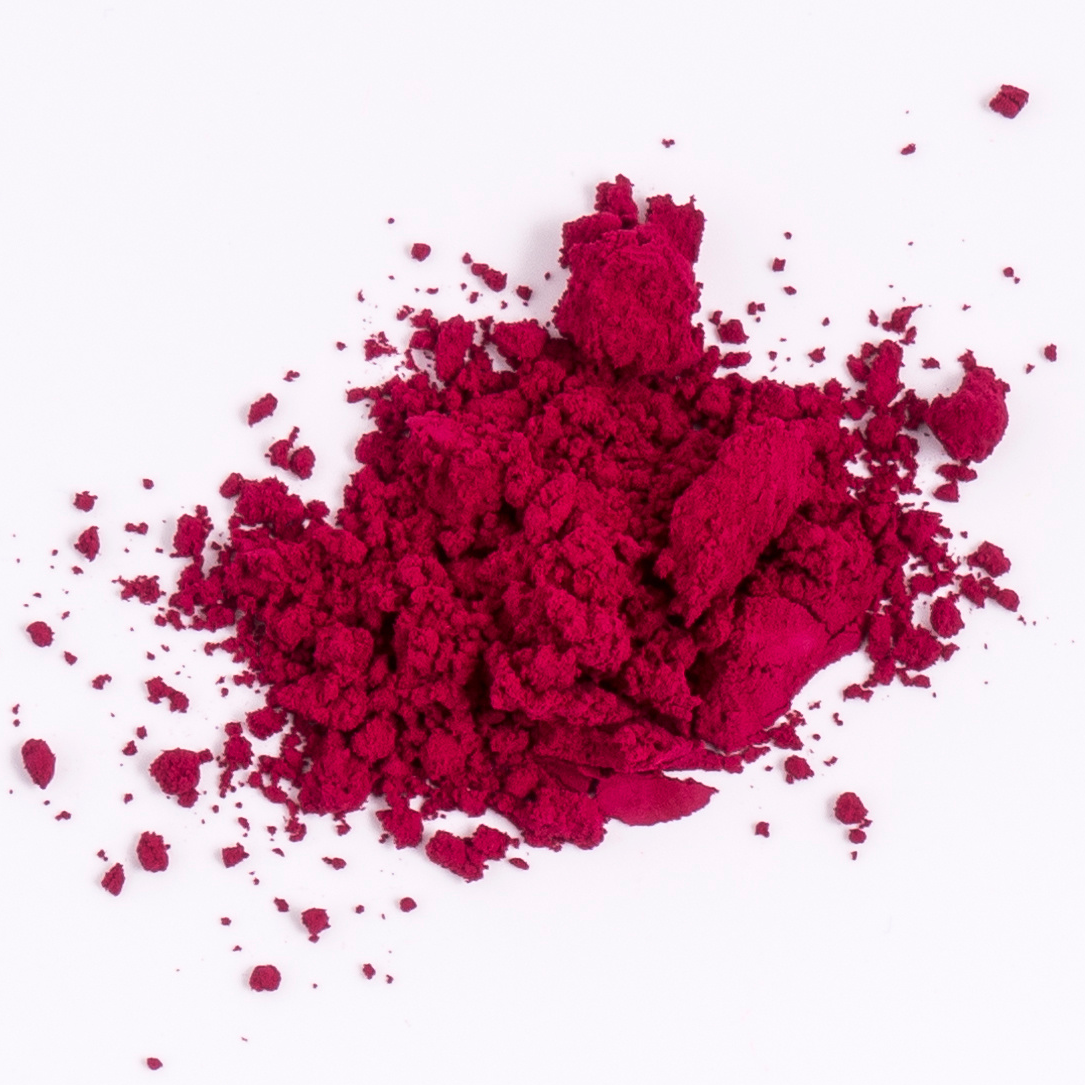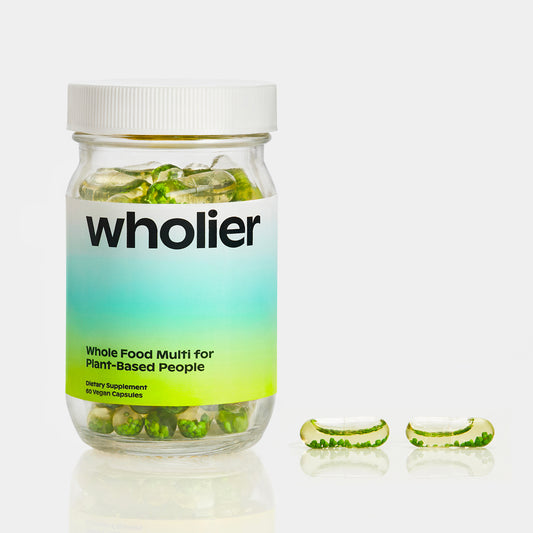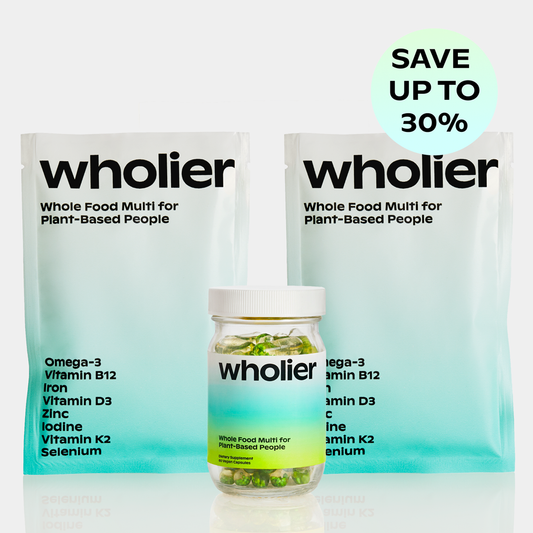
Why Vegans and Vegetarians Need Vitamin B12 & How Much to Take Per Day
Vitamin B12 is arguably the most important nutrient for vegans and vegetarians, and yes—you should likely be supplementing with it. Here's why.
Vitamin B12 is a water-soluble vitamin, along with vitamin C and the other 7 B vitamins, which means it’s not stored long-term in your body and is regularly excreted. That's why it’s important to make sure you’re getting enough B12 on a daily basis.
While B12 is often associated with boosting energy, it’s more than just that. Vitamin B12 is essential for the development and function of your nervous system, red blood cell formation and DNA synthesis (1).
Vitamin B12 deficiency can impact anyone, though people who consume a totally or predominantly plant-based diet are at a higher risk for developing one.
Which foods have vitamin B12?
As the only known essential human micronutrient made exclusively by bacteria, vitamin B12 is found in animal foods such as beef, poultry, fish and dairy along with fortified foods and supplements. Vitamin B12 is present in ruminant animals—like cows, goats, and camels—because of the symbiotic relationship between them and the bacteria present in their stomachs (2). Bacteria in the human digestive tract produce vitamin B12 as well, but it’s not available for absorption as this happens physically too far down in the colon for proper utilization.
Plants do not create, use, or store vitamin B12 and are therefore not a reliable source. There are claims that seaweed, spirulina and other algaes contain B12; however, these foods typically contain inactive analogues of it and aren’t capable of meeting dietary requirements (3).
Certain foods have been fortified with vitamin B12, like some nutritional yeasts and plant-based milks, but the amounts may not be adequate or consistent enough to meet needs. This is why vegans and vegetarians need to specifically supplement their diet with vitamin B12.
Plants do not create, use, or store vitamin B12 and are therefore not a reliable source.
Another common myth is that bacteria living in the soil produce B12, so if you don’t wash your fresh produce before consuming it then you’ll get enough B12 from the produce. However, suggestions that we can rely on unclean, organic produce for B12 doesn’t currently have any reliable evidence behind it and therefore should not be followed.
Understanding the forms of vitamin B12
When you’re evaluating a supplement for its vitamin B12 content, it’s helpful to understand the difference between the various forms it comes in:
- Cyanocobalamin
- Methylcobalamin
- Adenosylcobalamin
- Hydroxocobalamin
Cyanocobalamin is the synthetic form of vitamin B12. As it’s the cheapest of all four forms, it’s the most common one found in supplements and fortified foods. It’s composed of a cobalamin molecule attached to a cyanide molecule. While this probably sounds concerning, don’t worry—the amount of cyanide contained in a supplemental dose of vitamin B12 is clinically insignificant and is less than most people consume daily as part of their everyday diet (4).
The body must convert cyanocobalamin into methylcobalamin and adenosylcobalamin before using it, otherwise known as “active” coenzyme forms of B12. This means that the methylated version of B12, the one used in wholier's multivitamin, is tissue-ready and doesn’t need to be converted before it’s absorbed (5,6).
Do you really need 6250% of daily recommended value of vitamin B12?
You may have noticed that supplements tailored to support individuals on a plant-based diet contain vitamin B12 in significantly higher amounts than the recommended dietary allowance (RDA). Here’s why.
In food, vitamin B12 is bound to protein, and needs to be removed from that protein and bind to another protein called intrinsic factor (IF) that allows your body to absorb it. Think of intrinsic factor as the bouncer in a popular nightclub—vitamin B12 can’t get in without it, and it only allows a small amount to enter at a time.
Here’s the catch: The amount of vitamin B12 that can be absorbed at one time with IF is about 1.5-2 mcg of B12 (7). After that, vitamin B12 is absorbed without IF and the rate drops significantly, at a passive diffusion rate of 1%.
In other words, the amount of vitamin B12 that can be absorbed from a single dose is actually quite minimal.
This isn’t a problem if vitamin B12 is consumed throughout the day in small doses, like with most omnivorous diets. However, in plant-based or plant-forward individuals, doses far greater than the RDA are needed to meet vitamin B12 needs if taken in a single dose.
Let’s do some fast, painless math: After the first 1.5-2 mcg of B12 are absorbed, the rest is passively absorbed at a rate of about 1%, making high vitamin B12 supplement levels much closer to the RDA. For men and women who aren’t pregnant or breastfeeding, the RDA is 2.4 mcg. That means a 150 mcg daily dose would provide ~2.46 mcg of absorbable vitamin B12, which is almost exactly the recommended amount for adults per day.
Here are some examples of appropriate B12 dosing for healthy adults (8,9):
- 100-150 mcg daily
- 1000 mcg 2x weekly
- 2500 mcg once weekly
Supplementation is a safer and more reliable way to ensure adequate vitamin B12 intake, but because fortified foods like some non-dairy milks and nutritional yeast contain added B12 they can also be used as an additional source.
A 150 mcg supplement would provide ~2.46 mcg of absorbable vitamin B12 — almost exactly the recommended amount for adults per day.
To ensure adequate intake from smaller amounts, it’s recommended to consume these foods throughout the day to maximize intrinsic factor absorption, the same way that omnivore diets receive small doses of B12 throughout the day through food.
Is there risk in taking too much vitamin B12?
Since vitamin B12 is a water-soluble vitamin, it's generally considered safe, even at high doses. There is no established upper limit for vitamin B12 because of its low potential for toxicity. Even very large doses are considered safe (10).
Excess vitamin B12 is stored in the liver, which is why you’ll hear anecdotal reports of vegans who haven’t supplemented with vitamin B12 in a few years, yet still have normal levels. However, because storage levels can vary so much from person to person, it’s still recommended for vegans and plant-based dieters to consume B12 daily.
There is no established upper limit for vitamin B12 because of its low potential for toxicity.
What are the signs of B12 deficiency?
Vitamin B12 is needed to make the myelin sheath surrounding nerve cells, which is why early signs of not getting enough B12 can include poor memory, fatigue and tingling in hands and feet (11,12,13). Vitamin B12 is also needed to make red blood cells and DNA.
Who needs a vitamin B12 supplement?
All plant-based diets should include a source of supplemental and/or fortified vitamin B12. While vegetarians and semi-vegetarians consume some sources of B12 such as milk and eggs, research has shown that there's a greater risk of vitamin B12 deficiency in these groups. B12 is poorly absorbed from eggs (~9%) and intake solely from these sources may fail to meet the RDA (14).
While vitamin B12 deficiency is often thought of as a plant-based problem, many omnivores, especially older adults, struggle with it too. As we age, our production of IF decreases, which consequently reduces the absorption of vitamin B12. In assessing intake levels in the United States and UK, roughly 6% of adults younger than 60 are considered vitamin B12 deficient, but that number jumps to almost 20% in those over 60 (15).
Bottom line: Prioritize your vitamin B12 intake
Vitamin B12 is a super important nutrient for everyone, and plant-based eaters need to pay extra attention to it. Deficiency symptoms can be subtle and take time to develop, so the best approach with vitamin B12 is to prevent not getting enough in the first place. In addition to rotating vitamin B12-fortified foods, plant-based eaters should be taking an appropriate dose of vitamin B12 on a regular basis to meet their needs.
Sources:
(1) Institute of Medicine (US) Standing Committee on the Scientific Evaluation of Dietary Reference Intakes and its Panel on Folate, Other B Vitamins, and Choline. Dietary Reference Intakes for Thiamin, Riboflavin, Niacin, Vitamin B6, Folate, Vitamin B12, Pantothenic Acid, Biotin, and Choline. Washington (DC): National Academies Press (US); 1998.
(2) Watanabe F. Vitamin B12 sources and bioavailability. Exp Biol Med (Maywood). 2007;232(10):1266-1274. doi:10.3181/0703-MR-67
(3) Watanabe F. Vitamin B12 sources and bioavailability. Exp Biol Med (Maywood). 2007;232(10):1266-1274. doi:10.3181/0703-MR-67
(4) Abraham K, Buhrke T, Lampen A. Bioavailability of cyanide after consumption of a single meal of foods containing high levels of cyanogenic glycosides: a crossover study in humans. Arch Toxicol. 2016;90(3):559-574. doi:10.1007/s00204-015-1479-8
(5) Obeid R, Fedosov SN, Nexo E. Cobalamin coenzyme forms are not likely to be superior to cyano- and hydroxyl-cobalamin in prevention or treatment of cobalamin deficiency. Mol Nutr Food Res. 2015;59(7):1364-1372. doi:10.1002/mnfr.201500019
(6) Adams JF, Ross SK, Mervyn L, Boddy K, King P. Absorption of cyanocobalamin, coenzyme B 12 , methylcobalamin, and hydroxocobalamin at different dose levels. Scand J Gastroenterol. 1971;6(3):249-252. doi:10.3109/00365527109180702
(7) Chanarin I. Absorption of cobalamins. J Clin Pathol Suppl (R Coll Pathol). 1971;5:60-65.
(8) Rizzo G, Laganà AS, Rapisarda AM, et al. Vitamin B12 among Vegetarians: Status, Assessment and Supplementation. Nutrients. 2016;8(12):767. Published 2016 Nov 29. doi:10.3390/nu8120767
(9) Zugravu CA, Macri A, Belc N, Bohiltea R. Efficacy of supplementation with methylcobalamin and cyancobalamin in maintaining the level of serum holotranscobalamin in a group of plant-based diet (vegan) adults. Exp Ther Med. 2021;22(3):993. doi:10.3892/etm.2021.10425
(10) Institute of Medicine (US) Standing Committee on the Scientific Evaluation of Dietary Reference Intakes and its Panel on Folate, Other B Vitamins, and Choline. Dietary Reference Intakes for Thiamin, Riboflavin, Niacin, Vitamin B6, Folate, Vitamin B12, Pantothenic Acid, Biotin, and Choline. Washington (DC): National Academies Press (US); 1998. 9, Vitamin B12. Available from: https://www.ncbi.nlm.nih.gov/books/NBK114302/
(11) Hasbaoui BE, Mebrouk N, Saghir S, Yajouri AE, Abilkassem R, Agadr A. Vitamin B12 deficiency: case report and review of literature. Pan Afr Med J. 2021;38:237. Published 2021 Mar 4. doi:10.11604/pamj.2021.38.237.20967
(12) Miller A, Korem M, Almog R, Galboiz Y. Vitamin B12, demyelination, remyelination and repair in multiple sclerosis. J Neurol Sci. 2005;233(1-2):93-97. doi:10.1016/j.jns.2005.03.009
(13) Clarke, R. (2008). B-vitamins and prevention of dementia: Plenary Lecture. Proceedings of the Nutrition Society, 67(1), 75-81. doi:10.1017/S0029665108006046
(14) Chanarin I. Absorption of cobalamins. J Clin Pathol Suppl (R Coll Pathol). 1971;5:60-65.
(15) Hunt A, Harrington D, Robinson S. Vitamin B12 deficiency. BMJ. 2014;349:g5226. Published 2014 Sep 4. doi:10.1136/bmj.g5226





